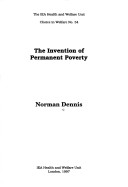Choice in Welfare S.
3 primary works
Book 12
"...one of the most talked about books of the year ...it has defined the terms of debate about lone parenthood, informed politicians, and won flattering notices in leader columns." New Statesman and Society "It was the publication in 1992 of the now famous Families Without Fatherhood report by two left-wing sociologists, Norman Dennis and George Erdos, which first called this whole anti-marriage (and anti-masculine) ideology into question. They pointed to the gradual collapse of the internal coherence of working-class culture caused by the relegation of men to the margins of social and family life in the inner cities and council estates of Britain. In doing so they were challenging the social work orthodoxy head on." Clifford Longley, The Daily Telegraph "Many on the left say that ...the link between lone-parenthood, crime and welfare dependency is unproven. But some powerful proponents of that linkage, who happen to be Labour supporters, such as Norman Dennis, George Erdos and A.H. Halsey, have put a radical back-to-basics cat among the status-quo welfare pigeons." The Economist "Dennis and Erdos, and A.H.
Halsey who provides the preface, argue the 'respectable' working class, even when faced with high levels of unemployment in the 1930s, did not turn to crime or rioting." Community Care "...interesting precisely because its authors ...are able to break through both left and right knee-jerk responses." The Guardian "For a book that opens out argument, rather than just dishes it out, read Norman Dennis." Times Literary Supplement "Whatever the truth of the argument, it is set to rage for some time. But if Norman Dennis's thesis is correct, we may all need to rethink our social attitudes." Times Education Supplement
Halsey who provides the preface, argue the 'respectable' working class, even when faced with high levels of unemployment in the 1930s, did not turn to crime or rioting." Community Care "...interesting precisely because its authors ...are able to break through both left and right knee-jerk responses." The Guardian "For a book that opens out argument, rather than just dishes it out, read Norman Dennis." Times Literary Supplement "Whatever the truth of the argument, it is set to rage for some time. But if Norman Dennis's thesis is correct, we may all need to rethink our social attitudes." Times Education Supplement
Book 18
Book 34
Crime is caused by poverty and unemployment! If poverty increases, then so too does crime. Such is the conclusion of the 'no-fault' theory of crime that holds sway among the social-affairs experts. In this book, Dennis argues with the central assumptions of this theory, focusing his criticism on the poverty lobby which claims "the poor are getting poorer and thus, so is crime". Dennis disagrees, instead arguing that rising crime is caused by decline in the family structure. The underlying theme here is that money will not help a problem which is essentially a moral and cultural one.


